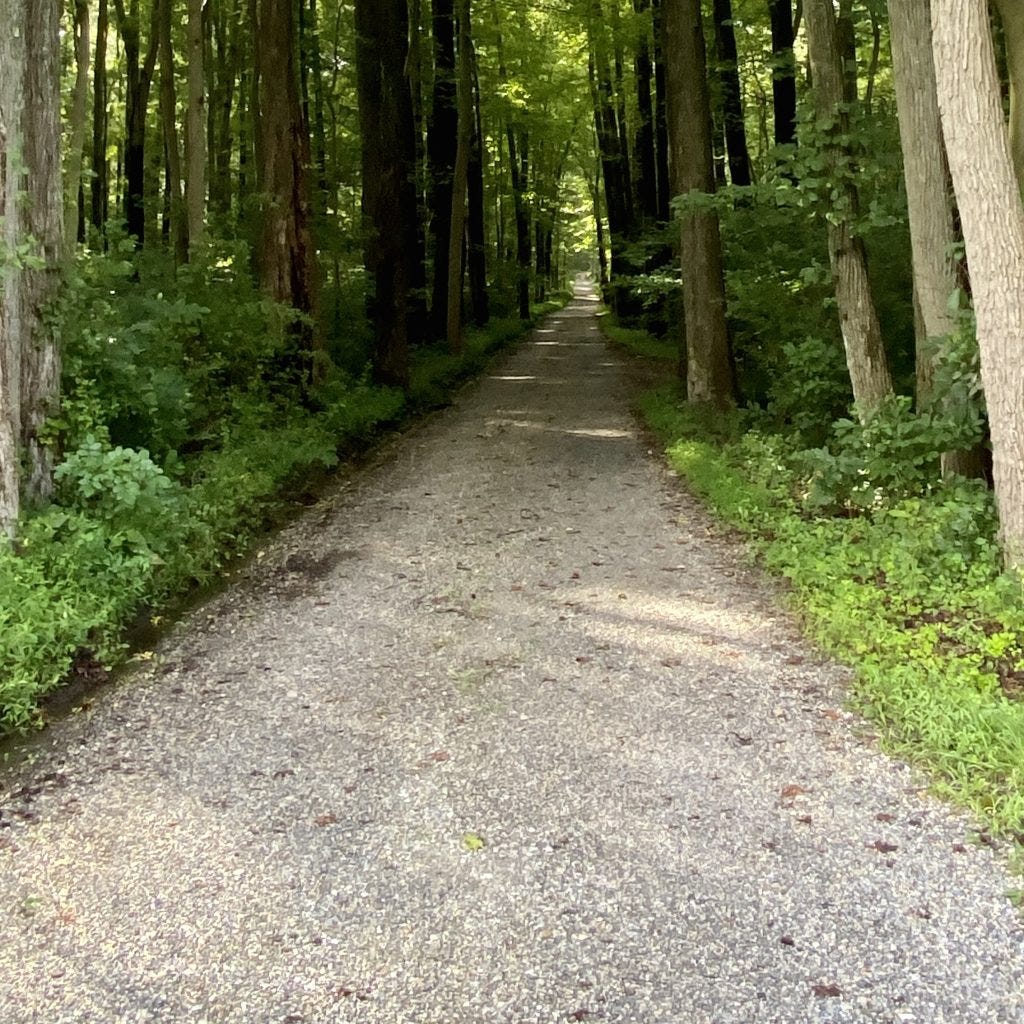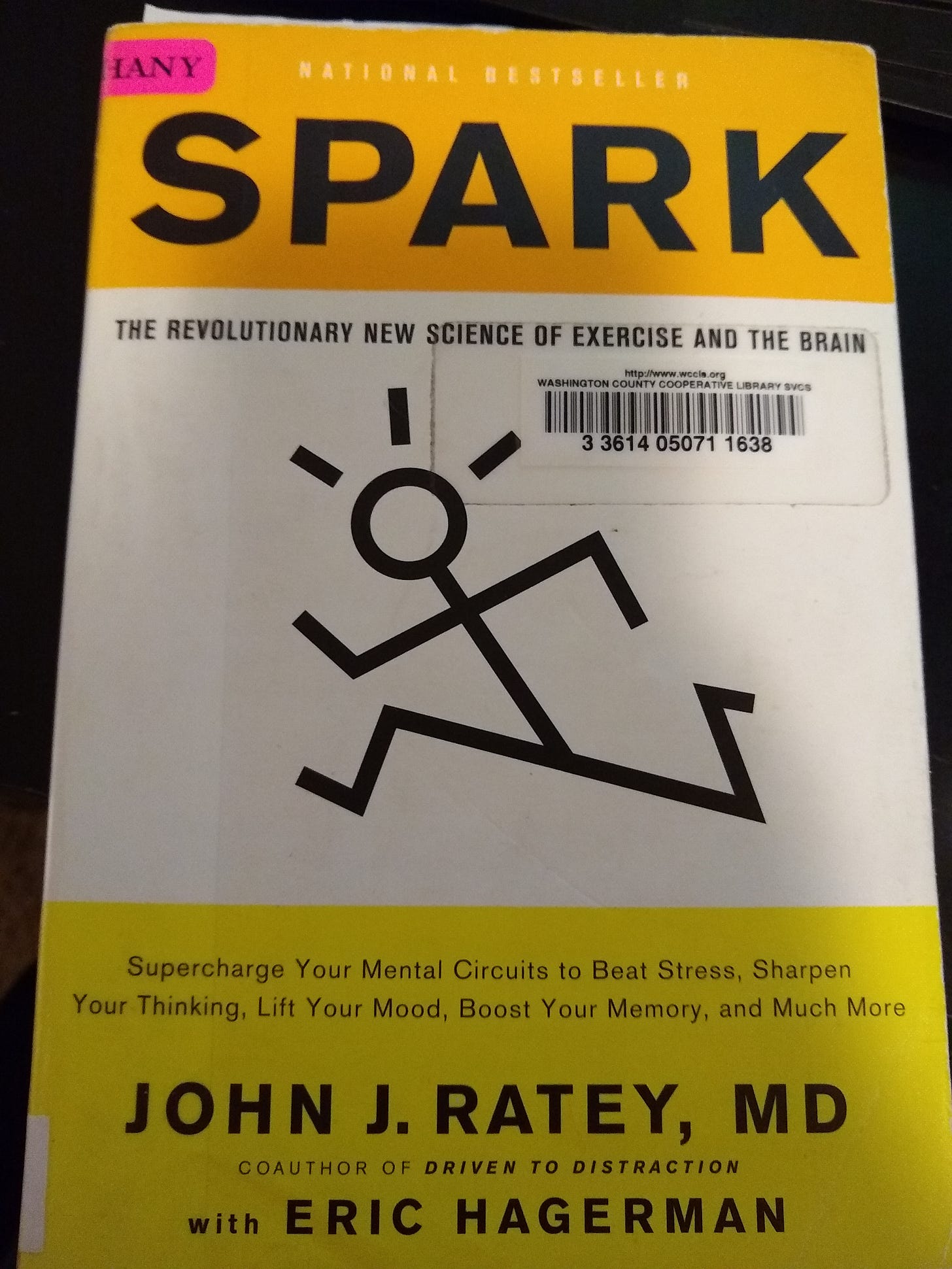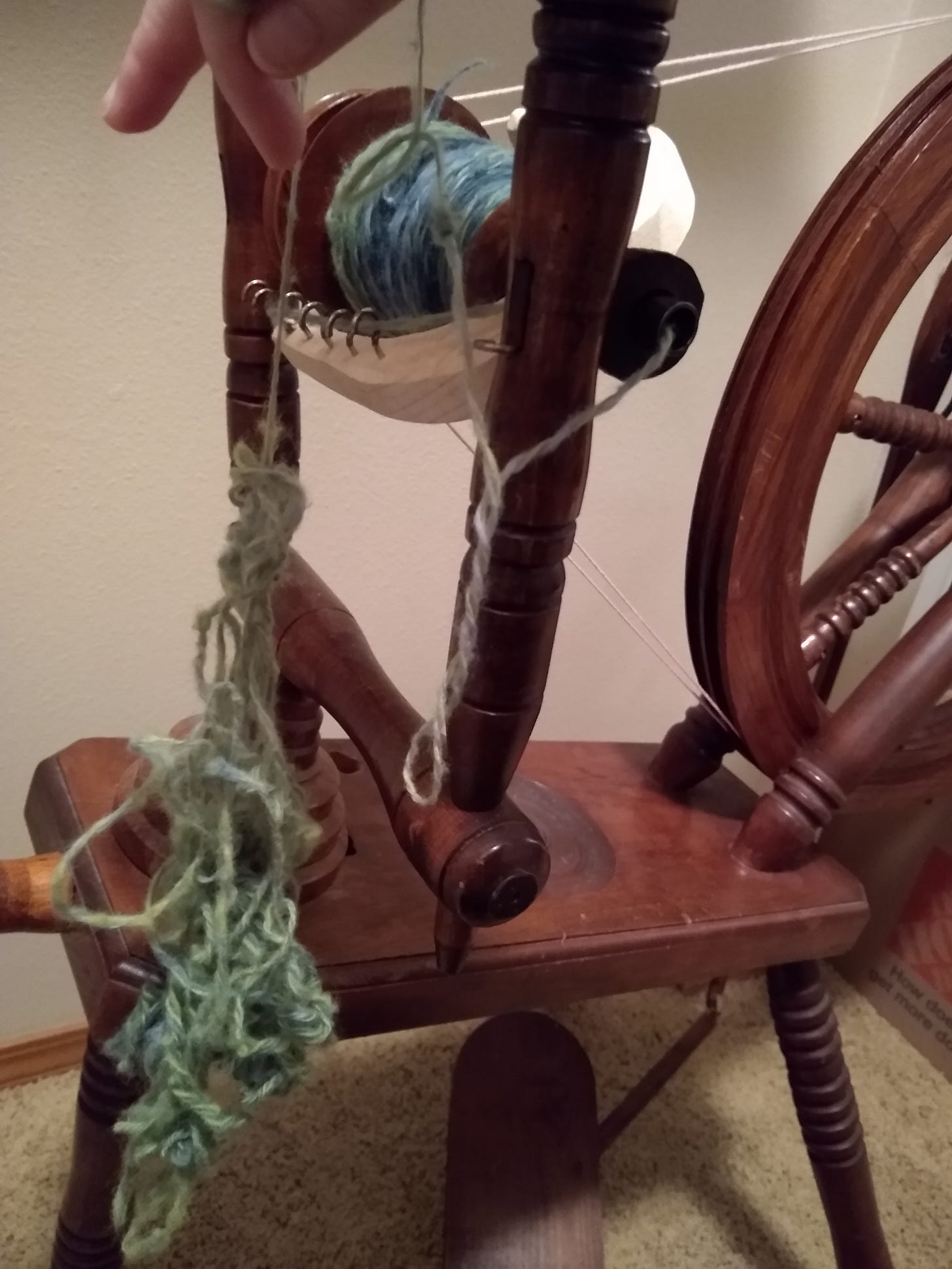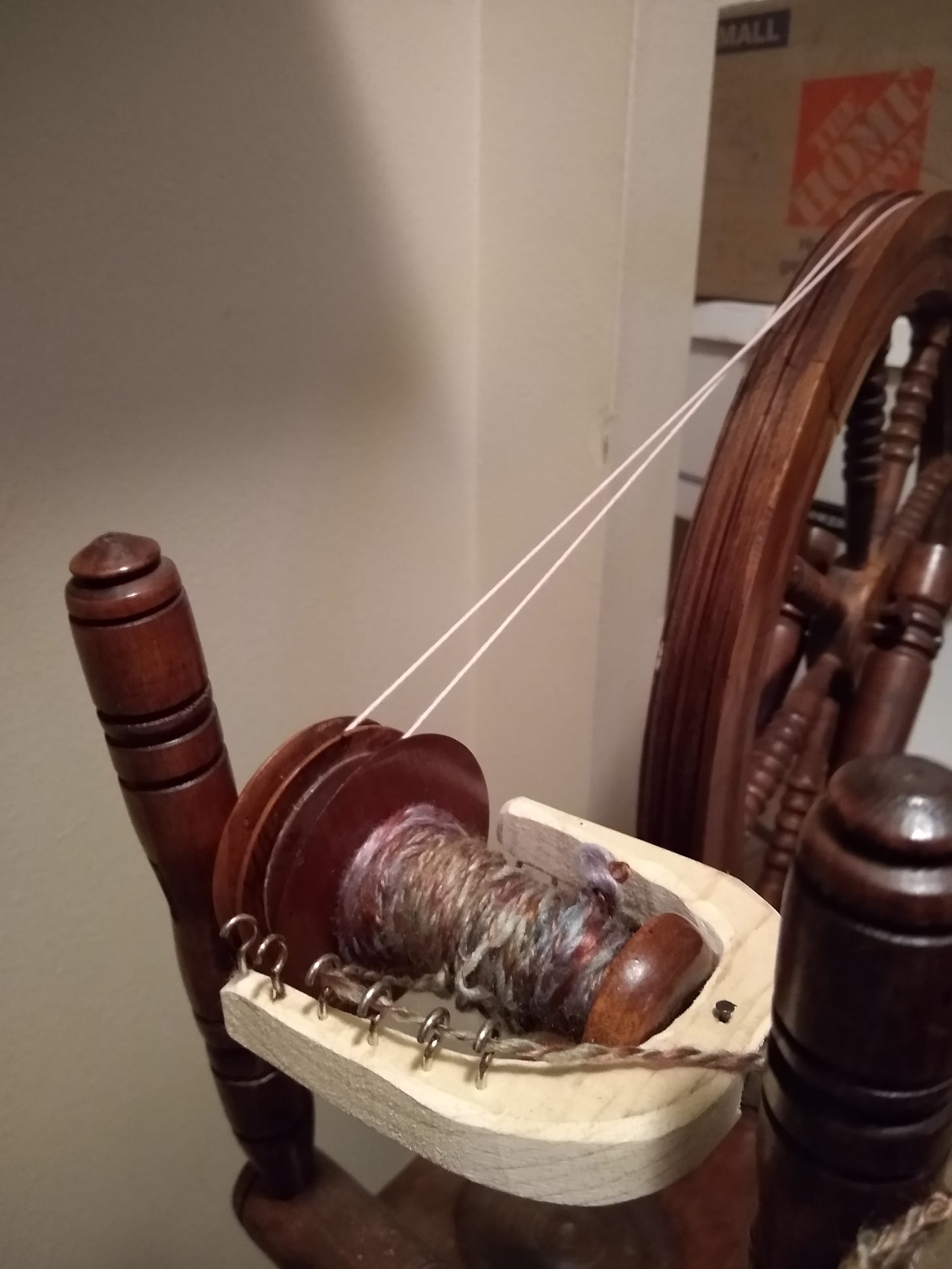Hi, friends!
I was so tired last Sunday. I thought I probably had COVID, and I did. Bleh. I still did a little bit of writing every day, but last Sunday when it was time for that last little bit to finish before hitting “Publish,” I figured having COVID was a good reason to go to bed instead this time. Sorrynotsorry?
Mostly I was just tired, other than my first full day of symptoms, last Friday (not the one two days ago, but the week before that). Then I was tired and sore, hot and cold for a bit, and kinda woozy whenever I moved my head much. But mostly okay if I just lay there. So as I said in my Felt Comfort Happy Place a week ago Saturday, of course I crocheted a macaron. I mean. What ELSE would a sane person possibly do? *blink blink*
Anyway. I’m much better now. Yay! So now you can have a novel! 😊
Tea I’m Drinking
Back to Irish Breakfast, yaaaay!
What’s Saving My Life
Well, if this is the COVID edition of SML, I should probably mention I’m grateful I didn’t get it until after I’d gotten the vaccine. Haven’t had my booster, but still. Although the vaccine probably didn’t literally save my physical life, it certainly made this a lot easier.
Now for what’s more metaphorically saving my life. Last week I was listening to an episode of my friend Kat’s podcast, The Ridiculous Hour. This episode, “The Boundary Protection Program.” I kept thinking of Psalm 16, different versions I had heard or memorized swirling around in my head. I think I first learned it in the New American Standard 1995, in which verse 6 reads, “The lines have fallen to me in pleasant places; Indeed, my heritage is beautiful to me.” Or in the English Standard Version, “the lines have fallen for me in pleasant places; indeed, I have a beautiful inheritance.”
I kept thinking of what these boundary lines were to the Psalmist, of how this was a literal inheritance of land, land handed down through generations, belonging to the tribe, the clan, the family.
The next podcast I listened to seemed like it wasn’t related at all. I don’t remember where I heard of this one, but I’m liking it. Some more good Enneagram stuff.
With the Enneagram, it seems like it’s common not to resonate at first with the struggle, passion, or vice of your type. But eventually to see it. And even more so with the countertypes. The most famous of these is the counter-phobic 6, who is afraid like the other subtypes of 6, but moves aggressively towards that fear in order to deal with it. It’s the fight or flight response. They may not be aware at first of any fear at all, because of the way they instinctively push against it.
I’m a countertype 4, which means I’m supposed to struggle with envy, but not necessarily be super aware of it. They say the countertype sees something he or she wants and then just goes out and works really hard to get it.
That… didn’t especially resonate, but that was basically expected, right? But then in this interview, one of them talked about introjection—like projection except we internalize things from the outside world instead of the other way around—and how we’re SO envious that we even take other people’s feelings and pretend they’re our own.
Whoa. Something clicked, with that. It’s not necessarily envy of things, it’s envy of experiences, emotions, stories, narratives, relationships, connections, belonging, group dynamics, you name it.
And that circles back to the first podcast episode I was talking about here, on boundaries. On pleasant, beautiful boundary lines and heritage.
Stay in your beautiful lane, Marcy. I went back to my Trello card from Kat’s podcast, and wrote,
“Thinking of this together with original context in Scripture together with the Enneagram podcast I'm listening to now. Is this about equanimity here, where I am, in the present? God is my Father, my Provider, and the Author. His story for me is perfect and complete, I don't have to envy anyone else's story or experience.”
Later after that, “You’ve made my life, my lane, the present moment here and now beautiful to me.”
Empathy is still a gift of mine, I think, but there’s that little bit of leaning back, of remembering to stay in my own body, to feel compassion while still being me, not getting lost in the other person’s experience. Especially crucial with my kids, they can’t regulate their own emotions yet, they need my help for that!
And then, again, I listened to something completely different after that. I love the Out of the Ordinary podcast, but with the pandemic and one thing and another I have a lot of their old episodes to listen to. The next one in my queue happened to be from back in August 2020.
It was called “Know Your Limits.”
What even.
And it was so, so good. I highly recommend it.
I loved its picture of limits, of Lisa-Jo’s son explaining to her how important it is in athletics not to say, “No Limits,” which is a big fat lie, but to know your limits, so that you don’t injure yourself, and can improve. To know, if there’s a big race or game coming up, where the limits are in the days leading up to that big race or game, so that you can really give it your best. And haven’t worn yourself out ahead of time.
And then she talked about discovering some of her own limits, how she’s found that she needs to be comfortable if she’s going to run, and she needs to put on her shoes and go first thing in the morning, before her brain has had a chance to wake up and question what she’s doing. That she needs to run somewhere that’s pretty.
Huh. So if I’m going to stay in my beautiful lane and bloom where I’m planted and all that, what are my limitations? Knowing that I’m frail and weak and a child of God, how do I keep certain things as easy as possible so that I will do them, and reach the simple little goals I have in mind?
Thinking of Lisa-Jo’s limits, I wrote, “If I don’t clean [dishes] as I go, I mostly won’t clean.”
Later (after therapy) I wrote, “How does staying in my beautiful lane and keeping my boundaries relate to putting the girls down for naps on time? Can I do that with compassion, not taking their emotions into me? How can we work together to set up the limits I need and they need? What are my limits in putting them to bed? When can or can’t I do this? What barriers make it seem too hard? How can I lean on God and treat them like Jesus in this?”
Later in that next day I listened to the latest episode of Out of the Ordinary, because I wanted to be a part of the podcast conversation at the Black Barn Online.
“When You Feel Like You’re Drowning.” Oof. This is grief. Anticipatory, complicated, compounded grief, waves and waves of it. Or balls bouncing around in a box, hitting the pain button.
Grief you couldn’t or didn’t anticipate. Yep. I remember that one, I remember the shock of getting the phone call from my sister that Dad had passed away. You kind of live in a fog after that.
Two months later, Mom finally passes away, after about ten years of Alzheimer’s. Two months after that, my little niece is diagnosed with leukemia. Two months later, pandemic. God? Really? Yep. Been there.
And it’s funny, here again comes that word. Equanimity. Again, what even. And in one sense, yes yes yes, equanimity is not my job, I’m not the peaceful center in the storm, Jesus is, sleeping in the boat. As a child of God, God wants us to bring Him all of it, all our fears and questions and tantrums, not to stuff them down and pretend they don’t exist, or to pretend to be the peaceful center ourselves. As any good parent, He provides the emotional regulation, it doesn’t come from us.
On the other hand, back to being a 4 and knowing my limits, I think for me right now at least, the virtue of equanimity does not mean I should have a totally even keel and not feel the pain and joys. (Well, of course not, even God feels with us the pain and joys, crazy as that is.) It means knowing my limits, staying in my beautiful lane instead of asking for someone else’s story. That envy.
Or even the envy of some idealized, future self. The “it’ll be better when…”
I remember again the summer of 2017, when I was pregnant with my youngest. We’d found out that she had Fetal Heterotaxy Syndrome, and her organs were not all in the usual places. But there was still a lot we didn’t know. Except that the odds were not in our favor.
A phrase God gave me at the time, in the horrible waiting, was “the congregation in the wilderness,” from Stephen’s speech in the book of Acts, before they stone him.
The Israelites had the very presence of God Himself with them in the wilderness, leading them step by step in the cloud and the pillar of fire. But they were almost never happy with where they were, they almost always wanted to be somewhere else. They wanted to go back to Egypt, or they were about to enter the Promised Land and didn’t want to, or they were told fine, you won’t enter, you’ll go wander around in the wilderness some more, and so then they did want to enter!
I didn’t want to be like that. I hardly knew how not to be, but I tried to lean on God in it, to enjoy His presence. To pray, “I do believe, help my unbelief.”
I guess I’m in a similar place now, in some ways. Not overwhelmed by grief, most days, but God seems to be saying, “Know Your Limits,” and I’m not entirely sure what they are or exactly how to live into that. But I’m thankful to Him for speaking, and I’m asking for His help. I’m a child of God and I have a looooot of limits. Sometimes it seems I hit each one of them on the regular, too. My limit of patience. My limit of can even. But He doesn’t.
What I’m Reading
I’m learning my instinct was right—since not curling up in the fetal position is something that matters to me, exercise is a very helpful thing. I mean, I knew that. But wow. Exercise isn’t just good for you, it is so good for you. For your brain as well as and together with your body. It’s good for memory, focus, attention, learning, executive functioning, mood… and I think even after all that, the list still goes on?
I highly recommend all P.E. teachers read this book. And other teachers. Parents, people with ADHD, depression, or anxiety, people with a brain and/or a body… 😁
Seriously, though. If you don’t want to understand all of the science behind why it works so well, there are certainly parts you can skim. But it’s a good read.
And go figure, it explains some of the science of what Lisa-Jo and Christie stumbled upon in the “Know Your Limits” episode.
I really loved a couple spots like this one:
“When Michelle and Krissy finally saunter over, Duncan asks for their times, but Michelle’s watch is still running. Apparently, she didn’t hit the blue button. Krissy did, though, and their times are the same. She holds up her wrist for Duncan. ‘Ten twelve,’ he says, noting the time on his clipboard. What he doesn’t say is ‘It looked like you two were really loafing around out there!’
“The fact is, they weren’t. When Duncan downloads Michelle’s monitor, he’ll find that her average heart rate during her ten-minute mile was 191, a serious workout for even a trained athlete. She gets an A for the day.”
Yeah, I love this enough I’m going to quote the other spot I’m thinking of, too.
“During the weekly mile, he tested the device on a sixth-grade girl who was thin but not the least bit athletic. When Lawler downloaded her stats, he couldn’t believe what he found. ‘Her average heart rate was 187!’ he exclaims. As an eleven-year-old, her maximum heart rate would have been roughly 209, meaning she was plugging away pretty close to full tilt. ‘When she crossed the finish line, she went up to 207,’ Lawler continues. ‘Ding, ding, ding!’ I said, You gotta be kidding me! Normally, I would have gone to that girl and said, You need to get your ass in gear, little lady! It was really that moment that caused dramatic changes in our overall program. The heart rate monitors were a springboard for everything. I started thinking back to all the kids we must have turned off to exercise because we weren’t able to give them credit. I didn’t have an athlete in class who knew how to work as hard as that little girl.’
“He realized that being fast didn’t necessarily have anything to do with being fit.”
So there you have it. 😊
The other thing that’s weird is that I wrote this section before listening to any of those podcasts, before all of that stuff in the “What’s Saving My Life” section. And yet again, it has to do with knowing your limits. Huh.
What Else I’m Listening To
Lord of Spirits is so good. Similar to when I first started listening to The BibleProject Podcast, there are some things that just make so. Much. Sense.
For example, how would an angel rebel, knowing that it can’t just… attack God? Well hey, if it can’t hurt God Himself directly, might it not try to hurt some of the creatures He loves?
The Bible never directly says the angels fell in one event before the Creation of our world. Might the first few chapters of Genesis be about a fall of an angelic being, not Adam and Eve alone?
Along those lines, apparently the word translated “serpent” in those chapters… well, originally in Hebrew it was only written with consonants, right? Vowels were added thousands of years later. And apparently the consonants for the word “serpent” are the same consonants that, what was it… Okay, I’m just gonna go back and quote from the transcript here, this is so good. (And yes, the Lord of Spirits episodes are very long, but worth it. And many of them have transcripts! Which makes it faster for some of us! If we go look those up.)
Fr. Stephen: Well, if it’s a noun, it means “serpent.” If it’s an adjective, it means “the shining one.”
Fr. Andrew: Oh, interesting!
Fr. Stephen: If it’s a verbal participle, it means “the cunning one” or “the deceptive one, the deceiver.”
Fr. Andrew: Aha.
Fr. Stephen: All three of those ideas, if you don’t have vowel points, it makes it very easy to do a wordplay where it can mean all three of those things.
Fr. Andrew: Yeah.
Fr. Stephen: This is a feature of Hebrew prose and poetry, to use a word in this kind of multivalent way, to convey all of these things. In terms of the snake part, remember that serpents are a class of angel. We talked about the seraphim last time, that seraph is the Egyptian word for a serpent. In just a moment, I’m going to talk a little bit about Ezekiel 28, where the story is told from another perspective, and in there the devil, before he fell, is referred to as a “guardian cherub.” Cherubs had a similar kind of role as a guardian of the divine throne in the ancient world. In Genesis 3, particularly in verses 14 and 15, the serpent himself is cursed by Yahweh. That curse is important in terms of understanding what’s going on here with the devil. What Yahweh says to him in Genesis 3:14-15 is:
Because you have done this, curséd are you beyond all beasts, all creatures, and beyond all of the animals of the field. On your belly you shall go and dust shall you eat all the days of your life. I will put enmity between you and the woman and your seed and her seed; he will bruise your head, and you will bruise his heel.
Verse 15 is meditated on a lot as being a sort of initial statement of the Gospel, but the part about “going on your belly and eating dust all the days of your life” is the part that gets turned into, “Oh, well, he lost his legs.” Ancient people weren’t stupid.
Fr. Andrew: Yeah, it’s not like snakes were eating dirt.
Fr. Stephen: They knew that snakes did not eat dirt; they saw them eat mice, just like we’ve seen them eat mice. They followed that. And so the “dust” that this is talking about, it’s the same word, because this is in the context also of Adam and Eve receiving the curse, that “dust they are and to dust they shall return.” So the imagery here is of the serpent, the devil, becoming the eater of the dead. We see in iconography Hades depicted this way, as sort of the serpent with a big, wide-open mouth, devouring people, devouring the dead. What’s happening here is not just about snakes; it’s about the devil. This is where he falls; this is where he is cast down.
Fr. Andrew: And he becomes…
Fr. Stephen: ...but to crawl on the earth.
Fr. Andrew: And he becomes the lord of death, right? He becomes associated with death.
Fr. Stephen: He’s cast down, and the word here for “ground,” translated “ground”: cast down to the ground or the earth, is erets in Hebrew, which is also a word that’s commonly used to refer to the [underworld].
Fr. Andrew: The underworld, right.
Fr. Stephen: So this is the devil being made… He’s made the prince of the underworld; he’s made the lord of death. And we see this referenced in the New Testament. One big example is Hebrews 2:14, which refers to “the one who holds the power of death, that is, the devil.”
Fr. Andrew: Oh, that’s right! Right, which is interesting to put it that way, like it doesn’t mean… It’s not like… Correct me if I’m wrong or getting this wrong: We’re not saying that he’s the one who gets to decide when people die, right?
Fr. Stephen: Right, yeah. That’s not [saying] he has the power to go around and kill whoever he wants. [Laughter] But the idea in the curse that’s put on Adam and Eve—“dust you are; to dust you will return”—it’s sort of God brought them out of nothing and they’re going to back to being nothing. Essentially the devil here is being made the lord of nothing. He has this kingdom of dust and ashes, which is what he will seize. This whole idea that, of course, in a lot of our hymnography at Pascha, that Christ invades the underworld and takes even that away from him, so he doesn’t even have that left to him, when all is said and done.
And this story, this same story, gets retold again by the Prophet Isaiah and the Prophet Ezekiel, about the devil, but they both tell it in terms of the stories being told in surrounding nations, surrounding Israel.
Fr. Andrew: So they’re co-opting what we would call pagan mythology, right?
Fr. Stephen: Right, or correcting it, saying, “Here’s your story; here’s the truth.”
Also, the Canaanites called I think Baal and other gods of theirs “sons of El,” “El” being the word for god in Hebrew as well. So when the Bible talks about “sons of God”… well, spirit, angel, demon, god, son of God, host of heaven, even stars, council of God, these are all talking about the same sort of being, apart from the difference that some of them are referring specifically to fallen spirits. (If it’s a good spirit? It will not accept worship.)
Ah yes, here’s some of that (but you can skip this if you felt like my above paragraph was sufficient):
Fr. Stephen De Young: What we find in the ancient cultures surrounding Israel is they had what we’ve mostly been taught if we’ve studied mythology in the modern world as a “pantheon,” that there’s sort of this group of gods who are in charge of things.
But that’s not really how it worked in the ancient world. The way it worked in the ancient world is that individual cities and places and regions and nations had a god, a spirit, whom they worshiped and whom they saw as sort of their patron in the heavens. Then when you have larger units develop, like Sumeria or Assyria or Achad or Syria, the Phoenicians, etc., all of those gods get put together in sort of a group. Generally, whichever city or region had ascendancy, their god is seen as sort of the king of the gods. It’s not just a question of there being one god who’s sort of on top at any given time, but uniformly, in all of these cultures, there is a divine father who is seen as the most high god, and then a divine son who is actually the primary god who receives worship, who is the one who presides in the council of the gods. So you have El and Baal with the Canaanites; you have Aya and Marduk with the Babylonians; you have Chronos and Zeus with the Greeks.
And the key difference here in the conception, when we get to Israel, is that they see Yahweh as filling sort of both of those roles. There is a Yahweh-the-divine-Father and a Yahweh-the-Son. And this isn’t something that Christians come up with; this is something that’s in the Torah.
Fr. Andrew: Right, and they’re both Most High God, which I think it’s really important to emphasize that title for a second, because—not that we want to dive back into what we talked about too much in our previous episode, although I think there’s going to be a lot of overlap between all of our episodes—but you don’t say Most High God if there aren’t other divine beings. And yet that title, the Most High, is used over and over again in the Scripture. So clearly there is this sense that he is God over other divine beings, and like you said, that in the case of ancient Israel, that the Most High God is both the Father and the Son, whereas in other… I mean, in most of those other stories, the son is overthrowing his father, typically, right? Isn’t that right?
Fr. Stephen: Yes. Or the son is overthrowing a previous most high god, at least. There’s what’s called the succession myth, the succession story, where there’s this transition. When we get to talking about the devil, we’ll talk about how the way he’s presented in Scripture is sort of mirroring those stories, but pointing out that that story actually had a different result.
Fr. Andrew: Yeah, and he fails.
Fr. Stephen: Right, and then the propaganda that the Baal-worshipers and the Marduk-worshipers, etc., the Zeus-worshipers would have you believe.
But it’s important also here to recognize, along with the difference—that there is Yahweh-the-Father and Yahweh-the-Son, and that there is no succession, those being two key differences—the rest of that picture, the picture that there is this council, this divine council, over which Yahweh presides, is very much in continuity between Israel and the surrounding nations. So the language that is used particularly by the Canaanites—the Canaanites referred to sort of the council of gods as the sons of El, because El was their most high god—so that sons of El, that sons of god language, is taken over directly into the Old Testament to refer to angelic beings, who are not gods in and of themselves, but are members of this council through whom God’s will is expressed. In the same way that a king on earth has viceroys and regents and advisors and other people around him, through whom he administers his kingdom, Yahweh the God of Israel is depicted as having these angelic beings, through whom he administers his kingdom which is of course all of creation.
Fr. Andrew: Yeah, and it’s interesting that they’re called sons of God. That shouldn’t be hard for us to grasp, because you mentioned earthly kingdoms. I mean, your average earthly king tends to put his sons and his brothers, his members of the family, he puts in charge of elements of the government. For human beings, that’s not always necessarily a good idea: just because you’re a member of the royal family doesn’t mean you’re good at it. But we’re not talking about human family here; we’re talking about God and his Son, our Lord Jesus Christ, and then these ranks of angels that are referred to as sons of God. That title appears in a number of places in the Scripture, doesn’t it, sons of God?
This particular meaning for “son of God,” well, it unpacks so far. Much further than you might think. It’s impressive, really. Anyway. Oh, and so does this whole idea that I’ve mentioned before that spiritual reality is reality. We habitually live like atheists, but as Christians, with the Spirit of God living in us, heaven meets earth here. And we live in the “already, but not yet” in so, so many ways.
What’s on My Spinning Wheel
This mess here was. 😊
Not anymore. It’s wound off onto my niddy-noddy and ready to wet finish. But it was. When I was first writing this.
What Else I’m Writing
Blues, Greens, Purples, where you can see what’s on my wheel now.
Or here. Here it is.
Your Turn
How about you, do you resonate with envy at all? How do you feel about limits? Any better now than you used to? 😁 Annoyed that I didn’t limit my word count here…? 😂
In Christ,
Marcy









Yes, yes, yes. Lot to soak in here. I am 100% with you on boundary lines. "I have stilled and quieted my soul like a weaned child..." This is my aim. To feel the pleasantness of God's lines for me. The best of childlike and the heart of meek. Glad you're feeling better, too, friend.
Marcy, I just returned from 2 funerals and a wedding this week and saw you’d made a post. Can I tell you that your core phrase — what’s saving my life right now — is magnificent! A testament to God’s constant presence. Your vulnerability and humility are beautiful. They makes us feel safe to be the broken/growing/still loved creatures of God we are. Thank you. Your take on the whole boundary thing is divine. I will take it with me forever. Thank you!